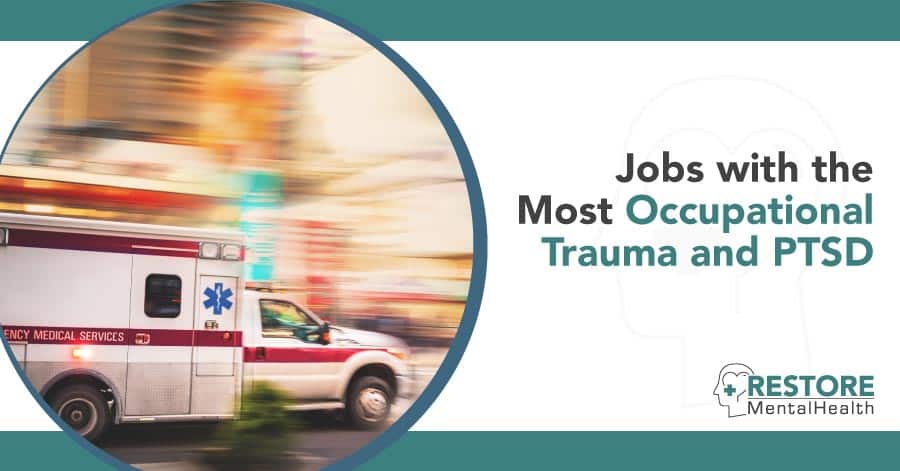According to the National Center for PTSD, over half the population will experience at least one traumatic event in their lifetime, such as an accident, assault or disaster. It’s common for individuals who experience trauma to suffer short-term physical and emotional hardships. For most people, the symptoms of trauma resolve over time. However, for approximately 6% of the population, trauma results in long-term complications, generally diagnosed as post-traumatic stress disorder (PTSD). The environment people work in can play a major role in causing the stress and trauma that trigger this condition. While PTSD from work is most commonly associated with combat soldiers, other workplace environments can cause trauma and PTSD.
What Is PTSD?
The Veterans Administration defines PTSD as a mental health disorder triggered by stress from a one-time or ongoing traumatic experience. Symptoms often start soon after the event but can appear months or years later, and these symptoms may come and go over the years. Someone may be diagnosed with PTSD if the symptoms are severe and last longer than four weeks.
The four major types of PTSD symptoms are:
- Reliving the experience through nightmares and flashbacks.
- Avoiding reminders of the event.
- Having more negative thoughts and feelings than before the event.
- Feeling anxious and overly sensitive to the surrounding environment.
PTSD From Work
The onset of PTSD is most associated with traumatic events, such as combat violence, abuse and disasters. However, a workplace environment can also cause the condition. The average adult spends a large portion of their life on the job. Therefore, any job stress can have long-term negative health consequences. It’s possible that PTSD in the workplace can happen from jobs with an unhealthy amount of stress and trauma.
Work-related PTSD is most often caused by exposure to the following workplace stressors:
- Poor management: Managers directly influence employees’ day-to-day lives, and ineffective managers can cause an overwhelming amount of stress. Long hours, lack of training and recognition, poor pay and micromanagement can take a toll on employees.
- Poor customers: Many employees must deal not only with a manager but also with the customers. Overly demanding and physically or emotionally abusive customers can negatively affect these employees.
- Sexual harassment and bullying: According to the Society for Human Resource Management, 61% of employees will experience harassment and bullying in the workplace. These traumatic experiences are worsened by fears that reporting the abuse could jeopardize their job.
- Dangerous work environments: Certain industries have physical hazards regularly present, including the risk of falling, machine injuries or being assaulted. Employees who fear their work environment are more likely to experience PTSD.
Again, it’s important to note not only can a one-time traumatic event at work cause PTSD, but long-term exposure to frequent traumatic stress can also cause it.
Which Occupations Have a High Incidence of PTSD?
In the media, PTSD is most commonly associated with soldiers returning from combat duty. According to the Veterans Administration, up to 20% of soldiers returning from combat suffer from the condition. However, other jobs are at risk of PTSD, including the following:
Disaster Responders
Employees on the front lines of disaster response are at a high risk of PTSD, including:
- Police, fire and ambulance first responders: Witnessing a disaster can be traumatic, and first responders are often the first on the scene. Seeing trauma inflicted on others can eventually take a toll on their mental health. Stress also increases from risking injury and death.
- Emergency room doctors and nurses: These employees often witness the bloody aftermath of traumatic events. In addition, they’re often asked to treat the medical needs of violent and abusive patients. Long hours can further exacerbate stress.
- Social workers and mental health professionals: These individuals help others who have experienced trauma. Over time, constant exposure to the worst of humanity can overwhelm a person.
- Journalists: This is another group of workers who place themselves in harm’s way to capture the aftermath of heartbreaking events.
- Prison correction officers: These employees put themselves in physical danger to keep the most abusive and violent of society safely locked up.
Retail and Service Workers
The occupations listed above are most at risk of PTSD because they’re exposed to traumatic events. However, you can also find PTSD sufferers at your local retail or food service operation, which are known for low pay, long hours and ineffective managers. These employees are often forced to deal with demeaning and abusive customers, as well as harassment from management and peers.
Importance of Acknowledging and Addressing Trauma
Many individuals can overcome PTSD from work by removing the stress from their life (e.g., quitting the job) and healing over time. However, some people are unable to cope with their trauma and struggle to live fulfilling lives. These individuals are at a high risk of self-medicating through substance abuse, which can lead to addiction issues that make it even more challenging to live happy, healthy lives.
When a traumatic experience leads to anxiety that interferes with day-to-day life, the person needs professional PTSD treatment. Available professional options include:
- Cognitive processing therapy (CPT): Helps PTSD sufferers identify connections between thoughts and emotions as they process their trauma
- Exposure therapy: Uses audio-visual tools to expose patients to their trauma and triggers in a controlled environment
- Group therapy: Provides a safe environment for PTSD patients to share their experiences and learn they’re not alone in their struggles
In severe cases, PTSD sufferers may benefit from inpatient residential care, where a team of mental health professionals can work intensely to stabilize the patient and begin therapy efforts.
Restore Is Here to Help PTSD Sufferers
If you or a loved one is experiencing work-related PTSD, the counselors and medical staff at Restore are available 24/7 to help start the journey to long-term mental and physical wellness. Contact us at (877) 594-3566 to learn more about our PTSD treatment programs.



